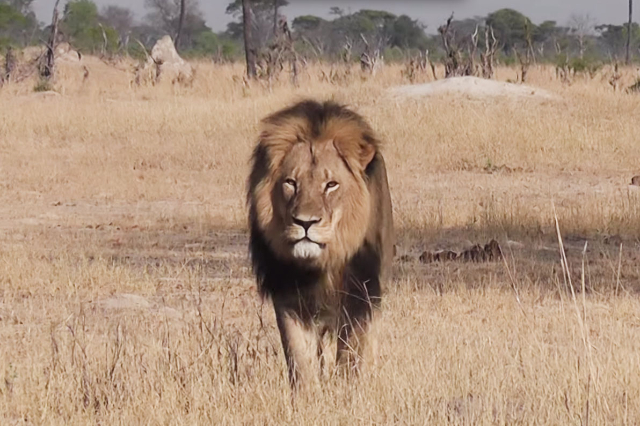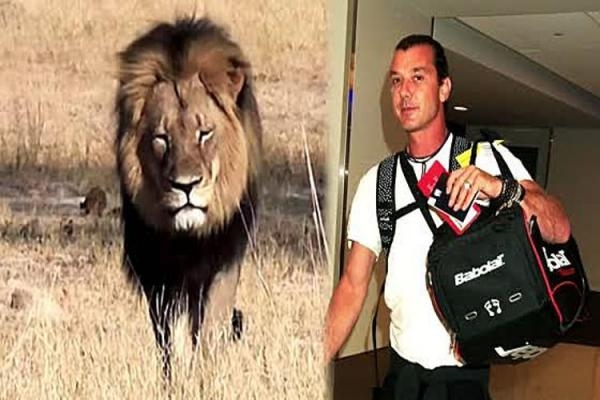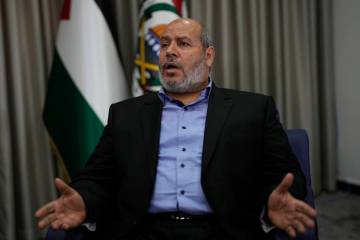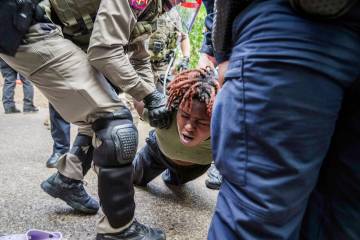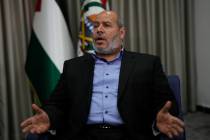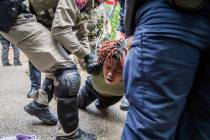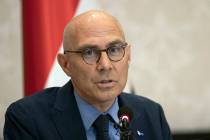Here’s the latest about Cecil the lion’s death
WASHINGTON — The U.S. Fish and Wildlife Service has not been able to contact the American dentist accused of killing a beloved lion in Zimbabwe, agency director Dan Ashe said on Thursday.
Ashe, in a post on Twitter, called the killing of Cecil the lion "tragic" and said his agency will "go where facts lead" in its investigation of the lion's death.
Suburban Minneapolis dentist Walter Palmer has admitted to killing the animal but said he believed the hunt was legal.
One evening this week, 200 people stood in protest outside the dental practice of 55-year-old Palmer, calling for him to be extradited to Zimbabwe to face charges of taking part in an illegal hunt.
Local police are also investigating death threats against Palmer, whose location is not known. Because many of the threats were online, police are having difficulty determining their origins and credibility.
Palmer, a lifelong big game hunter, has admitted killing Cecil with a bow and arrow on July 1 near Zimbabwe's Hwange national park, but said he had hired professional local guides with the required hunting permits and believed the hunt was legal.
WHAT LION?
As social media exploded with outrage this week at the killing of Cecil the lion, the untimely passing of the celebrated predator at the hands of an American dentist went largely unnoticed in the animal's native Zimbabwe.
"What lion?" acting information minister Prisca Mupfumira asked in response to a request for comment about Cecil, who was at that moment topping global news bulletins and generating reams of abuse for his killer on websites in the United States and Europe.
For most people in the southern African nation, where unemployment tops 80 percent and the economy continues to feel the after-effects of billion percent hyperinflation a decade ago, the uproar had all the hallmarks of a "First World Problem."
"Are you saying that all this noise is about a dead lion? Lions are killed all the time in this country," said Tryphina Kaseke, a used-clothes hawker on the streets of Harare. "What is so special about this one?"
As with many countries in Africa, in Zimbabwe big wild animals such as lions, elephants or hippos are seen either as a potential meal, or a threat to people and property that needs to be controlled or killed.
The world of Palmer, who paid $50,000 to kill 13-year-old Cecil, is a very different one from that inhabited by millions of rural Africans who are more than occasionally victims of wild animal attacks.
According to CrocBITE, a database, from January 2008 to October 2013, there were more than 460 recorded attacks by Nile crocodiles, most of them fatal. That tally is almost certainly a massive underrepresentation.
"Why are the Americans more concerned than us?" said Joseph Mabuwa, a 33-year-old father-of-two cleaning his car in the center of the capital. "We never hear them speak out when villagers are killed by lions and elephants in Hwange."
A Zimbabwean court charged a professional hunter on Wednesday with failing to prevent the killing and may charge others involved with poaching.
HUNTERS RETHINK TRIPS
Hunters longing to shoot big game in the African wild may choose a different target after public backlash against a Minnesota dentist who killed Zimbabwe's Cecil the lion just outside a national wildlife preserve.
African hunts are booked months in advance and pricey affairs, often costing $8,000 to $50,000, with approval needed from U.S. and U.N. agencies to bring back trophies such as the head of a lion to the United States.
"It has left a bad taste in their mouths," said James Jeffrey, a Houston-based international hunting agent with more than 12 years experience.
"They read all those books and it is people’s dreams to go over there and do it. Some of these guys have worked their whole lives to do this one hunt," he said.
Eleven African countries issue lion hunting permits. Of them South Africa's hunting industry is the biggest, worth $675 million, according to the Professional Hunters Association.
Americans make up the bulk of non-African hunters, with 15,000 going to the continent on hunting safaris each year, according to John Jackson, president of Conservation Force, a lobby group that says regulated lion hunting helps protect the animal by giving reserve owners a financial incentive to deter poachers and cultivate stock.
Supporters argue the money generated from hunts bolsters the coffers for conservation in emerging African countries that want to use their limited finances for social programs.
Critics see the hunts as an archaic bloodsport, hurting species such as lions, which an academic study in 2012 said had seen a population fall of nearly 70 percent in the last 50 years.
After Cecil's death, the Humane Society of the United States asked the U.S. government to increase protections for lions and crackdown on the import of trophies.
The U.S. Fish and Wildlife Service in October 2014 proposed placing the African lion under protections from the Endangered Species Act, which would make it more difficult for Americans to conduct licensed hunts and set up a system of permits for importing trophies from lion hunts. The proposal is still under consideration.
U.S. hunting agents contend that almost every American who goes hunting in Africa plays by the rules.
Like the RJ on Facebook:



